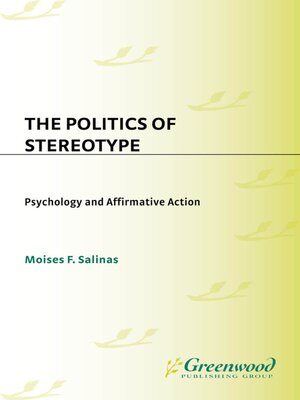The Politics of Stereotype
ebook ∣ Psychology and Affirmative Action · International Contributions in Psychology
By Moises F. Salinas

Sign up to save your library
With an OverDrive account, you can save your favorite libraries for at-a-glance information about availability. Find out more about OverDrive accounts.
Find this title in Libby, the library reading app by OverDrive.



Search for a digital library with this title
Title found at these libraries:
| Library Name | Distance |
|---|---|
| Loading... |
Affirmative Action was initially an emergency stop-gap measure to resolve a serious and immediate problem. As such, like most temporary corrective measures, it was imperfect: the guidelines vague and definition unclear, with a misguided understanding of merit. Stereotypes have not disappeared from American society. Prejudice has been transformed from overt actions in the 1950s to more subtle and indirect forms that are still prevalent. Salinas shows us that a long-term program is needed to solve the problem of inequality, not just compensate for it.
Affirmative Action was originally needed to deal with disparities - social, economic, political and educational - in America. What is needed is a new, long-term program to attack the root causes of inequality and prejudice. Salinas believes the quest to end disparity in this country must begin with educational reform, abandoning an antiquated educational model designed to serve an emerging industrial society and based on the values of the dominant white class of the time. He applies empirical evidence to reach policy conclusions moving beyond our current Affirmative Action.
Affirmative Action was originally needed to deal with disparities - social, economic, political and educational - in America. What is needed is a new, long-term program to attack the root causes of inequality and prejudice. Salinas believes the quest to end disparity in this country must begin with educational reform, abandoning an antiquated educational model designed to serve an emerging industrial society and based on the values of the dominant white class of the time. He applies empirical evidence to reach policy conclusions moving beyond our current Affirmative Action.







